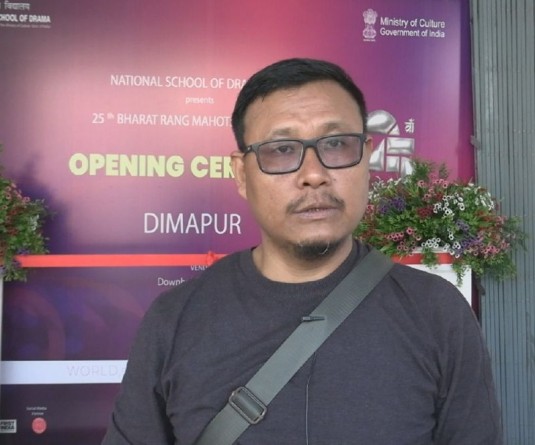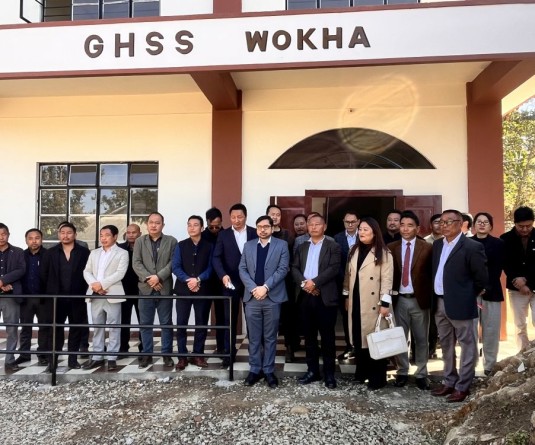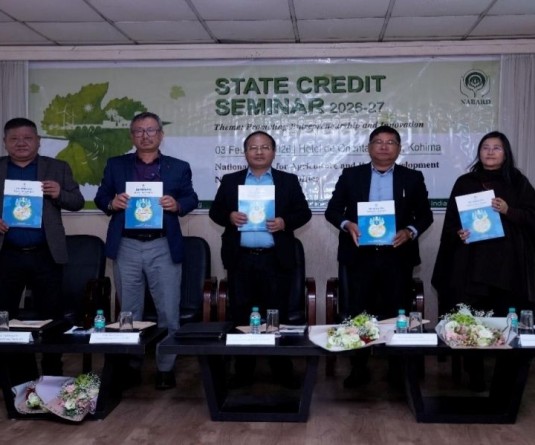KG Kenye addresses press conference in Kohima on July 25. (Morung Photo)

• Cites ‘direct threat’ to customary laws, social and religious practices of Nagas
• Conveys stance to Law Commission
Our Correspondent
Kohima | July 25
The Government of Nagaland (GoN) today reiterated its stand against the implementation of the proposed Uniform Civil Code (UCC) in the State and has told the 22nd Law Commission of India (LCI) that any such proposal is ‘direct threat’ to customary laws, social and religious practices of Nagas.
Announcing this during a press conference here at Hotel Japfü, Nagaland’s Parliamentary Affairs and Power Minister, KG Kenye informed that State Government had earlier requested the Commission to exempt Nagaland from the purview of the UCC.
In addition, the State Government has also made the submission to the Chairperson of the 2nd LCI during the recent visit of a ministerial team led by Chief Minister Neiphiu Rio to Delhi on July 4.
Referring to its submission, Kenye said that the GoN highlighted to the Commission that Nagaland has a chequered history and for half a century “our forefathers waged an intense resistance movement against the intruding British Expeditions into our land.”
“Only after thousands of precious lives were lost on both sides, towards the end of the 19th century the fierce battles subsided with Peace Treaties pledging for a ‘No More Wars’ Bilateral Agreements between them with the assurance of the ‘Non-interference policy’ into our ways of life in matters pertaining to administration of our social practices, religious practices, the adjudication of criminal justices through our customary laws,” it read.
As a testimony of their commitment towards this end, the British Parliament enacted the BEFRA of 1873 (Bengal Eastern Frontier Regulations Act) and the ILP provisions were enforced in toto ever since, the submission asserted.
“This was the reason why, basing on our representation of 1929 we were categorised as the ‘Excluded Areas’ during the Reforms Scheme of 1935 separating our Administration from the rest of British India,” it added.
This status continued until the eve of India's Independence resulting in 9-point Akbar Hydari Agreement of June 1947, where also the main issue was the ‘Assurance of the Non Interference Policy,’ the GoN stated.
However, it noted that the 1947 Agreement was short-lived and soon snow-balled into an intense conflict transforming the epicentre in Naga Hills into a “full-blown war zone inflicting lakhs of civilian causalities,” it further noted.
Consequently, Nagaland was not represented in the Constituent Assembly of 1951 and it did not participate in the General Elections of 1952 and 1957, the submission further informed.
Only with the Declaration of the General Amnesty in 1957, an opportunity to restore peace and normalcy arrived but since the Political group remained relentless even after 3 years of persuasion and hectic parleys, the Naga Tribal Representatives organised themselves to formulate the 16-Point Agreement after the Government of India (GoI) recognised the history and struggles of the Nagas, it said.
With full trust in the secular democratic principles of the nation and on the assurance to uphold the "Non Interference Policy,’ the 16-Point Agreement was signed in July 1960 at New Delhi, it asserted.
The sincerity of the GoI, the submission read, was proven when this assurance was enacted by the Parliament in 1962 and enshrined into the Constitution of India as the Article 371(A) stating: "Notwithstanding anything in this Constitution.
No Act of Parliament in respect of the: (i) Religious or social practices of the Nagas. (ii) Naga customary law and procedures. (iii) Administration of civil and criminal justice involving decisions according to Naga Customary Laws. (iv) Ownership and transfer of land and its resources".
The Article 371(A) stood as a constitutional guarantee by the GoI to the people of Nagaland and only on the strength of this Political Agreement, it entered into the Union of India as the 16th State on December 1, 1963, it stressed.
Nevertheless, Nagaland still continue to endure violence, turmoil and bloodsheds and is confronted with serious challenges both internally and externally, it stated adding that the Peace talks and negotiations are also dragging on for decades and does not auger well with the uncertainties looming large.
With these prevailing tense situations, the State is moving through uncharted waters, it highlighted.
Accordingly, the State Cabinet is making this submission highlighting the background and representing the sentiments of the Naga people on the matters relating to the UCC, it added.
To this end, the GoN asserted that any proposal for a UCC is a “direct threat” to customary laws, social and religious practices governing every individual of the Naga society and hence, cannot be condoned and is outrightly resented.
“So if such a law is to be imposed, breaching the Constitution Article 371(A), it will certainly shake the very foundation of our relationship. Taking into account all these facts of history, the State Government of Nagaland request the Commission to exempt Nagaland from the purview of implementing the Uniform Civil Code,” it stated.
On Ministerial Group, ENPO issue
The recently constituted Ministerial Group on Petroleum & Natural Gas headed by the Chief Minister will focus on the matter of Petroleum & Natural Gas in the undisputed areas of the state, Kenye told press conference. Stating that Nagaland has so much natural resources deposit in the petroleum and natural gas in the undisputed areas also, he added: “so it we leave it as it is then we will be the losers.” With limited resources, perhaps, the government is trying to tap some revenue and use it for the development of the people, he added.
Meanwhile, he further noted that the State Government had not been averse to the demand of Centre granting a new entity to the six districts of the state as demanded by Eastern Nagaland Peoples’ Organisation (ENPO) and will now be part of the negotiations to reach the final agreement, PTI reported.
“Prior to our visit to Delhi earlier this month, it was bilateral talks purely between the Ministry of Home Affairs and ENPO and nobody meddled in the negotiations. But, ENPO area being part of the state and the geopolitical jurisdiction falling under the present Nagaland state, the government and the rest of the people of the state were anxious about the progress of the dialogue,” he said. Therefore, the state government has stepped in to check how things are progressing, he added.






